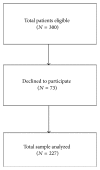Dispositional Affect in Unique Subgroups of Patients with Rheumatoid Arthritis
- PMID: 27445594
- PMCID: PMC4904597
- DOI: 10.1155/2016/1024985
Dispositional Affect in Unique Subgroups of Patients with Rheumatoid Arthritis
Abstract
Background. Patients with rheumatoid arthritis may experience increased negative outcomes if they exhibit specific patterns of dispositional affect. Objective. To identify subgroups of patients with rheumatoid arthritis based on dispositional affect. The secondary objective was to compare mood, pain catastrophizing, fear of pain, disability, and quality of life between subgroups. Methods. Outpatients from a rheumatology clinic were categorized into subgroups by a cluster analysis based on dispositional affect. Differences in outcomes were compared between clusters through multivariate analysis of covariance. Results. 227 patients were divided into two subgroups. Cluster 1 (n = 85) included patients reporting significantly higher scores on all dispositional variables (experiential avoidance, anxiety sensitivity, worry, fear of pain, and perfectionism; all p < 0.001) compared to patients in Cluster 2 (n = 142). Patients in Cluster 1 also reported significantly greater mood impairment, pain anxiety sensitivity, and pain catastrophizing (all p < 0.001). Clusters did not differ on quality of life or disability. Conclusions. The present study identifies a subgroup of rheumatoid arthritis patients who score significantly higher on dispositional affect and report increased mood impairment, pain anxiety sensitivity, and pain catastrophizing. Considering dispositional affect within subgroups of patients with RA may help health professionals tailor interventions for the specific stressors that these patients experience.
Similar articles
-
Mood, Disability, and Quality of Life among a Subgroup of Rheumatoid Arthritis Individuals with Experiential Avoidance and Anxiety Sensitivity.Pain Res Manag. 2016;2016:7241856. doi: 10.1155/2016/7241856. Epub 2016 Apr 17. Pain Res Manag. 2016. PMID: 27445625 Free PMC article.
-
Psychological Distress in Out-Patients Assessed for Chronic Pain Compared to Those with Rheumatoid Arthritis.Pain Res Manag. 2016;2016:7071907. doi: 10.1155/2016/7071907. Epub 2016 Mar 1. Pain Res Manag. 2016. PMID: 27445623 Free PMC article.
-
Low back pain subgroups using fear-avoidance model measures: results of a cluster analysis.Clin J Pain. 2012 Oct;28(8):658-66. doi: 10.1097/AJP.0b013e31824306ed. Clin J Pain. 2012. PMID: 22510537 Free PMC article. Clinical Trial.
-
A meta-analysis of the associations of elements of the fear-avoidance model of chronic pain with negative affect, depression, anxiety, pain-related disability and pain intensity.Eur J Pain. 2022 Sep;26(8):1611-1635. doi: 10.1002/ejp.1994. Epub 2022 Jul 7. Eur J Pain. 2022. PMID: 35727200 Free PMC article. Review.
-
Pain beliefs and problems in functioning among people with arthritis: a meta-analytic review.J Behav Med. 2016 Oct;39(5):735-56. doi: 10.1007/s10865-016-9777-z. Epub 2016 Aug 9. J Behav Med. 2016. PMID: 27506911 Review.
Cited by
-
Pain catastrophizing in rheumatic diseases: prevalence, origin, and implications.Rheumatol Int. 2024 Jun;44(6):985-1002. doi: 10.1007/s00296-024-05583-8. Epub 2024 Apr 12. Rheumatol Int. 2024. PMID: 38609656 Free PMC article. Review.
References
-
- Hallert E., Husberg M., Kalkan A., Skogh T., Bernfort L. Early rheumatoid arthritis 6 years after diagnosis is still associated with high direct costs and increasing loss of productivity: the Swedish TIRA project. Scandinavian Journal of Rheumatology. 2014;43(3):177–183. doi: 10.3109/03009742.2013.835442. - DOI - PubMed
MeSH terms
LinkOut - more resources
Full Text Sources
Other Literature Sources
Medical


